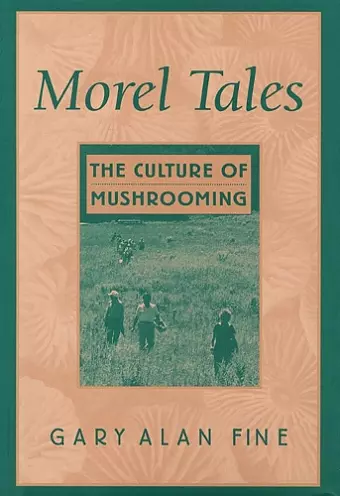Morel Tales
The Culture of Mushrooming
Format:Hardback
Publisher:Harvard University Press
Published:30th May '98
Currently unavailable, and unfortunately no date known when it will be back

In this thoughtful book, Gary Fine explores how Americans attempt to give meaning to the natural world that surrounds them. Although "nature" has often been treated as an unproblematic reality, Fine suggests that the meanings we assign to the natural environment are culturally grounded. In other words, there is no nature separate from culture. He calls this process of cultural construction and interpretation, "naturework." Of course, there is no denying the biological reality of trees, mountains, earthquakes, and hurricanes, but, he argues, they must be interpreted to be made meaningful. Fine supports this claim by examining the fascinating world of mushrooming.
Based on three years of field research with mushroomers at local and national forays, Morel Tales highlights the extensive range of meanings that mushrooms have for mushroomers. Fine details how mushroomers talk about their finds--turning their experiences into "fish stories" (the one that got away), war stories, and treasure tales; how mushroomers routinely joke about dying from or killing others with misidentified mushrooms, and how this dark humor contributes to the sense of community among collectors. He also describes the sometimes friendly, sometimes tense relations between amateur mushroom collectors and professional mycologists. Fine extends his argument to show that the elaboration of cultural meanings found among mushroom collectors is equally applicable to birders, butterfly collectors, rock hounds, and other naturalists.
As with the best of good sociology, we are quickly persuaded [in Morel Tales] that by studying seemingly esoteric behavior, mushroom hunting, we can learn about basic social processes. Examining the odd can lead to confrontation with what is central to human experience...Fine argues and illustrates with rich data that there is no nature without culture and no culture without particular social groups acting within concrete situations...A well-crafted sociological study, Morel Tales weaves together a well-developed grounded theory with interesting ethnographic description. .. Next time someone asks me 'What's so special about the way sociologists approach the world? What do sociologists have to offer?' I will recommend Morel Tales. -- Robert Bogdan * Contemporary Sociology *
A delightful ethnographic analysis of the culture of field mycologists (mushroomers) as a paradigm of the customs of naturalists in general (birdwatchers, ramblers, botany clubs, etc.)...This book is strongly recommended to all introspective naturalists, particularly field mycologists and their professional colleagues, and should be a priority acquisition for any library...with a natural history collection. -- Royall T. Moore * Society for General Microbiology Quarterly [UK] *
This book is first and foremost an eminently readable ethnography about the everyday lives of hobbyist mushroomers, the social world framing these lives, and the mentality of these enthusiasts as it springs from their leisure passion...[T]his study constitutes a rare contribution to the sociology of science, a field where ethnographic research is rare and the role of amateurs consistently ignored. -- Robert A. Stebbins * Canadian Journal of Sociology *
If traipsing about in the woods looking for fungi is your idea of a great time, then Gary Alan Fine's Morel Tales: The Culture of Mushrooming is the book for you...Dr. Fine presents the experiences and perspectives of several mycolophiles in their own words. From encounters with wild animals to tales of valuable mushroom findings along with some blunders, these pages provide insights into the popularity of the mushrooming pastime...I thoroughly enjoyed Morel Tales and can recommend it to both amateur and professional mycologists. -- Stephen S. Daggett * American Biology Teacher *
- Nominated for Mary Douglas Prize 2001
ISBN: 9780674089358
Dimensions: unknown
Weight: 590g
336 pages